Leadership workshops are evolving, incorporating interactive exercises and real-world applications․ They focus on skill development, fostering collaboration, and practical leadership growth through engaging activities and tools like Dare to Lead and The Leadership Challenge․ These workshops emphasize personal growth, effective communication, and decision-making, ensuring participants can apply learnings immediately in their professional environments․
Why Leadership Workshops Are Important
Leadership workshops are essential for addressing the growing leadership gap in organizations․ With 61% of companies offering no formal leadership training, these workshops bridge the skills gap by equipping individuals with practical tools and strategies․ They foster trust, collaboration, and decision-making skills, enabling leaders to inspire and guide teams effectively․ Workshops also promote self-awareness and emotional intelligence, helping leaders align their values with organizational goals․ By focusing on real-world applications, these sessions ensure participants can immediately apply their learnings, enhancing workplace performance and satisfaction․ Ultimately, leadership workshops empower individuals to become role models, shaping a positive organizational culture and driving sustainable growth․
Overview of Workshop Objectives
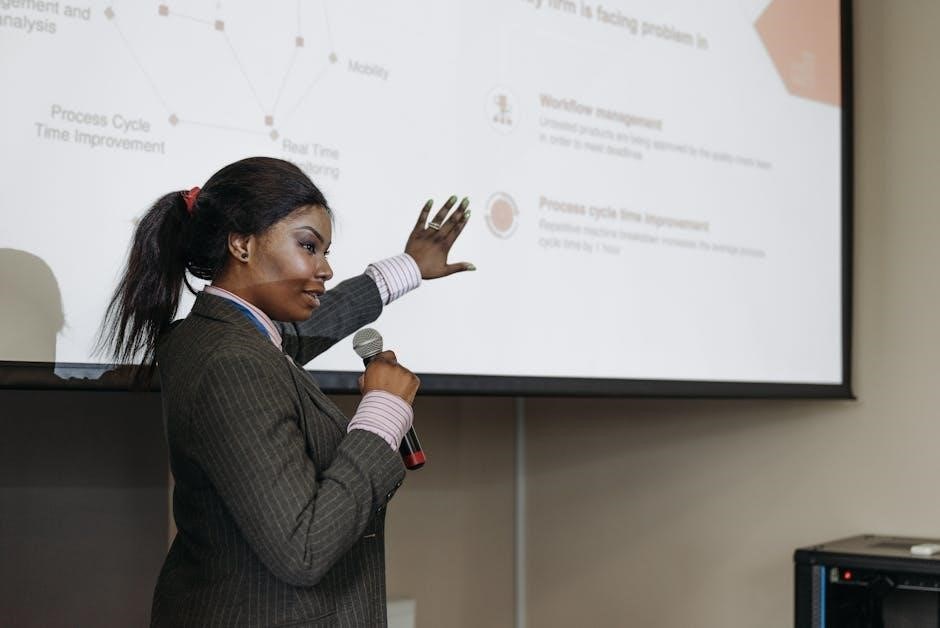
Workshop objectives focus on enhancing leadership capabilities through interactive and experiential learning․ They aim to develop essential skills like communication, decision-making, and problem-solving while fostering emotional intelligence and trust․ Participants engage in activities designed to promote collaboration and personal growth, such as role-playing, team-building exercises, and real-world simulations․ These objectives also emphasize self-assessment and the creation of actionable plans, ensuring leaders can apply their learnings directly to their professional environments․ By aligning individual development with organizational goals, workshops strive to cultivate confident, adaptable leaders who inspire and motivate their teams, driving both personal and organizational success․
Key Components of Effective Leadership Training
Effective leadership training combines practical exercises with theoretical insights to foster skill development․ Key components include interactive activities like team-building, problem-solving, and decision-making exercises, which enhance collaboration and critical thinking․ Soft skills such as communication, emotional intelligence, and adaptability are prioritized to create well-rounded leaders․ Feedback mechanisms and self-assessment tools enable participants to identify strengths and areas for improvement․ Real-world simulations and case studies provide context, helping leaders apply learnings to actual workplace challenges․ These components ensure training is engaging, relevant, and impactful, equipping leaders with the tools to inspire and guide their teams effectively while driving organizational success․
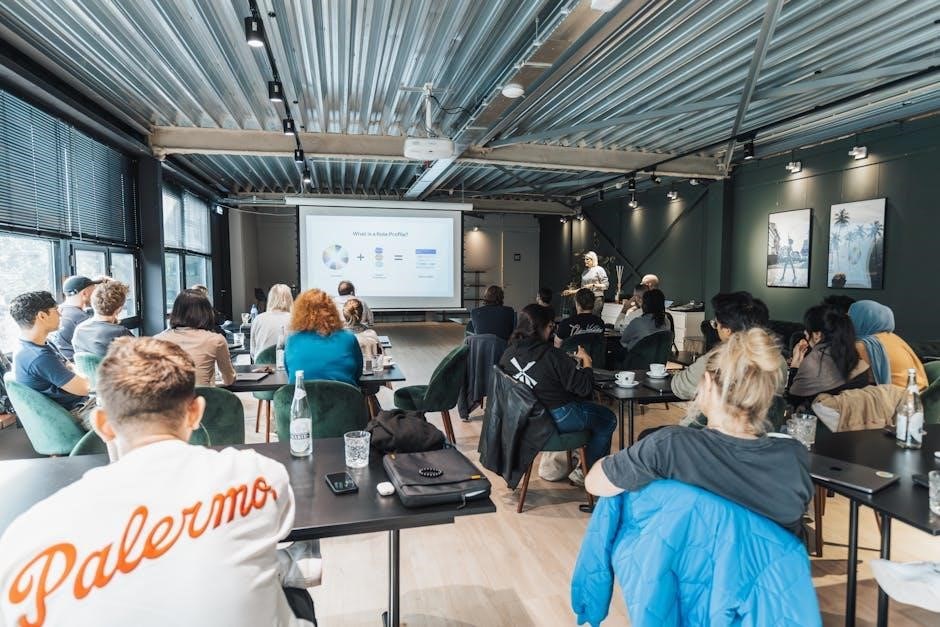
Structure of a Leadership Workshop
A leadership workshop typically includes interactive activities, team-building exercises, decision-making tasks, and simulations․ These elements create an engaging environment for participants to practice and refine leadership skills effectively․

Icebreaker Activities to Engage Participants
Icebreaker activities are essential for creating a positive and inclusive atmosphere in leadership workshops․ They help participants feel comfortable, build connections, and transition into a productive mindset․ Examples include group introductions, human bingo, and quick team trivia․ These activities encourage interaction, reduce initial awkwardness, and set the tone for collaboration․ They also provide a platform for participants to share their experiences and perspectives, fostering mutual respect and understanding․ By incorporating fun and engaging icebreakers, workshops can ensure active participation from the outset, making the learning experience more dynamic and effective․ These activities are often simple yet impactful, laying the groundwork for deeper leadership development and teamwork exercises later in the session․
Team-Building Exercises for Collaboration
Team-building exercises are designed to foster collaboration and strengthen interpersonal relationships among participants․ These activities encourage active participation, promoting trust and communication․ Examples include group problem-solving challenges, role-playing scenarios, and collaborative brainstorming sessions․ Such exercises help participants understand their roles within a team and appreciate diverse perspectives․ They also enhance leadership skills by encouraging shared decision-making and accountability․ These exercises are often dynamic and interactive, ensuring that participants remain engaged while learning valuable teamwork strategies․ By focusing on collective goals, team-building activities create a foundation for effective collaboration, which is essential for successful leadership in any organizational setting․ These exercises are adaptable to various group sizes and time constraints, making them a versatile tool for leadership development programs․
Decision-Making Activities to Foster Leadership
Decision-making activities are crucial for developing leadership skills, as they simulate real-world scenarios where leaders must make informed choices․ These exercises often involve case studies, simulations, or group tasks that require strategic thinking and problem-solving․ For example, participants might analyze leadership dilemmas or engage in role-playing scenarios that test their ability to prioritize and make ethical decisions․ Such activities encourage critical thinking, creativity, and accountability․ They also help leaders understand the impact of their decisions on teams and organizations․ By practicing decision-making in a controlled environment, participants build confidence and improve their ability to lead effectively․ These exercises are often supported by tools like “The Leadership Challenge” and “Dare to Lead” workbooks, which provide frameworks for effective decision-making and leadership growth․
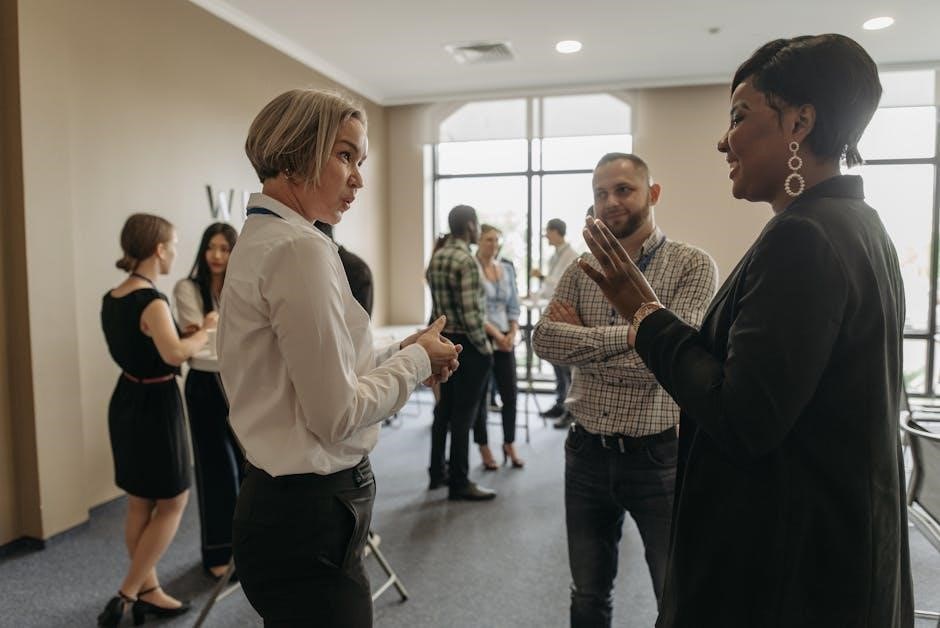
Leadership Development Activities
Leadership development activities focus on enhancing communication, emotional intelligence, and problem-solving to empower leaders․ Tools like “Dare to Lead” and “The Leadership Challenge” provide practical frameworks․
Communication Skills Enhancement
Effective communication is the cornerstone of leadership․ Workshops often include activities like role-playing, group discussions, and public speaking exercises to refine these skills․ Leaders learn to articulate their vision, actively listen, and engage teams․ Tools like “Dare to Lead” offer practical exercises to enhance clarity and empathy in communication․ Participants practice delivering constructive feedback and receiving it gracefully, fostering open dialogue․ These activities are designed to empower leaders to inspire and motivate others through clear, impactful communication, ensuring alignment and collaboration within teams․ By honing these skills, leaders can navigate complex situations and build strong, trust-based relationships, essential for organizational success․ Workshops also emphasize non-verbal cues and adaptability in communication styles to suit diverse audiences and scenarios․
Emotional Intelligence Exercises
Emotional intelligence (EQ) is critical for effective leadership․ Workshops incorporate exercises to help leaders recognize and manage emotions, both their own and others․ Activities include self-assessment tools, role-playing scenarios, and group discussions to explore empathy and stress management․ Participants learn to identify emotional triggers and develop strategies to maintain composure under pressure․ Practical exercises, such as “emotional awareness mapping,” help leaders understand how emotions influence decisions and relationships․ These exercises foster a supportive environment, enabling leaders to connect deeply with their teams, build trust, and resolve conflicts constructively․ By enhancing EQ, leaders can create a positive work culture, drive engagement, and achieve sustainable success․ Workshops emphasize the importance of self-awareness and empathy in guiding others effectively․
Problem-Solving and Conflict Resolution
Leadership workshops often include activities designed to enhance problem-solving and conflict resolution skills․ These exercises encourage leaders to approach challenges methodically and remain calm under pressure․ Activities such as group problem-solving tasks, case studies, and simulations help participants practice critical thinking and collaboration․ Role-playing scenarios mimic real-world conflicts, allowing leaders to refine their negotiation and mediation techniques․ Workshops emphasize the importance of active listening and empathy in resolving disputes effectively․ Through these exercises, leaders learn to identify root causes of conflicts and develop actionable solutions․ The goal is to equip leaders with the tools to foster a positive work environment, manage disagreements constructively, and drive teams toward shared goals․ These skills are essential for building trust and ensuring organizational success․

Practical Exercises for Leadership Growth
Practical exercises like trust-building activities, role-playing scenarios, and group problem-solving tasks foster leadership growth by encouraging collaboration, decision-making, and real-world application of skills․
Trust-Building Activities
Trust-building activities are essential in leadership workshops as they foster collaboration and strengthen team dynamics․ These exercises, such as team challenges and interactive games, encourage open communication and reliance on others․ By engaging in activities that require mutual support, participants develop trust, which is crucial for effective leadership․ Workshops often include exercises where individuals must depend on their peers to achieve common goals, promoting a culture of trust and accountability․ These activities not only enhance interpersonal relationships but also equip leaders with the tools to build and maintain trust within their teams, leading to improved teamwork and organizational success․
Role-Playing Scenarios

Role-playing scenarios are a dynamic way to immerse participants in real-world leadership challenges, allowing them to practice decision-making and communication in a safe environment․ These exercises often involve simulating workplace situations, such as conflict resolution or team management, where participants can experiment with different leadership styles․ By taking on various roles, individuals gain insight into diverse perspectives and refine their problem-solving skills․ Workshops frequently incorporate role-playing to help leaders navigate complex scenarios, fostering adaptability and confidence․ For example, participants might act out a difficult conversation or a crisis management situation, receiving feedback to improve their approach․ This interactive method bridges the gap between theory and practice, equipping leaders with practical tools to handle real-life challenges effectively․ Role-playing scenarios are a cornerstone of effective leadership development, promoting growth and preparedness․
Group Problem-Solving Tasks
Group problem-solving tasks are interactive exercises designed to challenge participants to work collaboratively and develop leadership skills; These activities often involve complex scenarios or case studies that require creative solutions․ By engaging in these tasks, individuals learn to communicate effectively, delegate responsibilities, and make decisions under pressure․ For example, participants might be divided into teams to address a hypothetical workplace crisis or brainstorm innovative strategies for a business challenge․ These exercises foster critical thinking, adaptability, and teamwork, essential qualities for leaders․ The goal is to empower participants to approach problems systematically and lead their teams toward successful outcomes․ Group problem-solving tasks are a practical way to build leadership competencies in a dynamic, real-world context․ They encourage collaboration and prepare leaders to tackle challenges confidently․
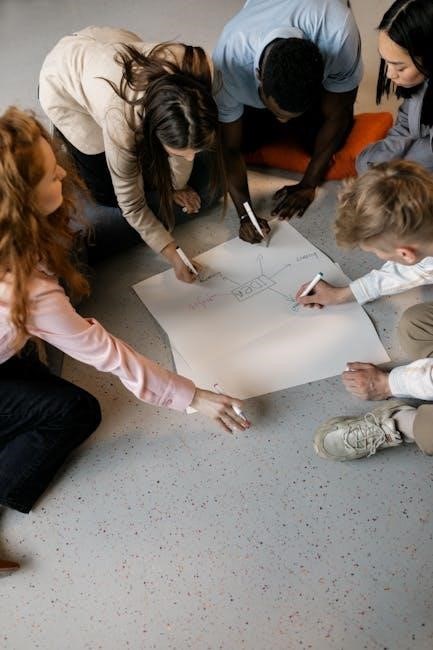
Feedback and Self-Assessment
Feedback and self-assessment are vital components of leadership development․ They enable participants to reflect on their performance, identify strengths, and areas for improvement․ Constructive feedback fosters growth․ Workshops often include tools like questionnaires and exercises for self-reflection, helping leaders gain insights into their leadership styles and effectiveness․ This process encourages accountability and continuous improvement, essential for refining leadership skills․ By incorporating feedback and self-assessment, workshops ensure participants can apply their learnings effectively in real-world scenarios․ These elements are crucial for personal and professional development․ They help leaders become more self-aware and proactive in their growth journey․ Effective feedback mechanisms create a supportive environment for leaders to thrive․ Regular self-assessment ensures sustained progress․ Leadership workshops emphasize the importance of feedback for fostering innovation and collaboration․ Constructive criticism is key to unlocking potential․ Self-assessment tools empower leaders to take ownership of their development․ This dual approach ensures comprehensive growth․ Workshops often provide structured frameworks for delivering and receiving feedback, enhancing communication skills․ Leaders learn to give and receive feedback gracefully, promoting a culture of transparency․ Self-assessment exercises include journals, peer reviews, and goal-setting, fostering accountability․ These practices culminate in well-rounded leaders capable of navigating challenges effectively․ Feedback and self-assessment are integral to leadership success․ They ensure continuous improvement and adaptability in dynamic environments․ Through these practices, leaders develop resilience and a growth mindset․ Feedback loops create a cycle of learning and development․ Self-assessment ensures leaders remain aligned with their goals and values․ Workshops provide resources to master these skills, empowering leaders to inspire and motivate their teams․ Effective feedback and self-assessment are essential for achieving organizational success․ They foster a culture of continuous improvement, driving leadership excellence․ These practices ensure leaders remain adaptable and responsive to change․ Feedback and self-assessment are cornerstone elements of effective leadership development programs․ They provide the foundation for sustained growth and excellence in leadership roles․ By integrating these components, workshops equip leaders with the tools to excel in diverse situations․ Feedback and self-assessment are vital for leadership effectiveness․ They enable leaders to refine their skills and lead with confidence and clarity․ These practices are essential for fostering strong, capable leaders․ Workshops emphasize their importance, ensuring participants can apply these skills in their professional lives․ Feedback and self-assessment are key to unlocking leadership potential; They provide the insights necessary for continuous growth and development․ Through these practices, leaders become more effective and influential․ Feedback and self-assessment are critical for leadership success․ They ensure leaders are well-equipped to handle challenges and inspire their teams․ These elements are fundamental to any leadership development program․ Workshops focus on these areas to produce confident, capable leaders․ Feedback and self-assessment are essential for leadership growth․ They provide the tools needed to navigate complex situations effectively․ Workshops emphasize their value, preparing leaders for long-term success․ Feedback and self-assessment are integral to leadership development․ They enable leaders to identify areas for improvement and develop a growth mindset․ These practices are vital for achieving leadership excellence․ Workshops provide structured approaches to feedback and self-assessment, ensuring leaders gain the necessary insights․ Feedback and self-assessment are crucial for leadership effectiveness․ They allow leaders to refine their skills and lead with purpose․ These components are essential for producing well-rounded leaders․ Workshops incorporate these elements to drive leadership success․ Feedback and self-assessment are key to fostering growth․ They ensure leaders remain adaptable and proactive․ These practices are vital for leadership development․ Workshops emphasize their importance, equipping leaders with the tools for continuous improvement․ Feedback and self-assessment are fundamental to leadership development․ They provide the foundation for sustained growth and effectiveness․ Workshops focus on these areas to empower leaders․ Feedback and self-assessment are essential for leadership success․ They enable leaders to thrive in dynamic environments․ These components are critical for achieving organizational goals․ Workshops integrate feedback and self-assessment to produce capable leaders․ Feedback and self-assessment are vital for leadership excellence․ They ensure leaders are equipped to handle challenges confidently․ These practices are essential for fostering strong leadership․ Workshops emphasize the importance of feedback and self-assessment․ Feedback and self-assessment are core elements of leadership development․ They provide insights for continuous improvement․ Workshops incorporate these components to empower leaders․ Feedback and self-assessment are crucial for leadership growth․ They ensure leaders remain adaptable and resilient․ These practices are vital for long-term success․ Workshops focus on feedback and self-assessment to produce effective leaders․ Feedback and self-assessment are essential for leadership effectiveness․ They enable leaders to refine their skills and inspire their teams․ These components are key to achieving organizational success․ Workshops emphasize feedback and self-assessment to develop strong leaders․ Feedback and self-assessment are integral to leadership development․ They provide the tools for continuous growth and adaptation․ Workshops incorporate these practices to equip leaders with the necessary skills․ Feedback and self-assessment are vital for leadership success․ They ensure leaders are well-prepared to face challenges․ These elements are crucial for fostering leadership excellence․ Workshops focus on feedback and self-assessment to drive growth․ Feedback and self-assessment are essential for leadership effectiveness․ They enable leaders to lead with confidence and clarity․ These practices are vital for producing capable leaders․ Workshops emphasize the importance of feedback and self-assessment․ Feedback and self-assessment are key to leadership development․ They provide the foundation for sustained success․ Workshops incorporate these components to empower leaders․ Feedback and self-assessment are crucial for leadership growth․ They ensure leaders remain proactive and adaptable․ These practices are essential for achieving long-term goals․ Workshops focus on feedback and self-assessment to produce strong leaders․ Feedback and self-assessment are vital for leadership excellence․ They enable leaders to navigate complex situations effectively․ These elements are fundamental to leadership success․ Workshops emphasize feedback and self-assessment to drive continuous improvement․ Feedback and self-assessment are essential for leadership effectiveness․ They provide insights for refinement and growth․ Workshops incorporate these components to develop well-rounded leaders․ Feedback and self-assessment are crucial for leadership development․ They ensure leaders are equipped to handle challenges confidently․ These practices are vital for fostering leadership excellence․ Workshops focus on feedback and self-assessment to produce capable leaders․ Feedback and self-assessment are integral to leadership success․ They enable leaders to adapt and grow in dynamic environments․ These elements are essential for achieving organizational objectives․ Workshops emphasize feedback and self-assessment to empower leaders․ Feedback and self-assessment are fundamental to leadership development․ They provide the tools for continuous improvement and effectiveness․ Workshops incorporate these practices to drive leadership success․ Feedback and self-assessment are vital for leadership growth․ They ensure leaders remain resilient and proactive․ These components are crucial for long-term leadership effectiveness․ Workshops focus on feedback and self-assessment to produce strong, capable leaders․ Feedback and self-assessment are essential for leadership excellence․ They enable leaders to refine their skills and lead with purpose․ These practices are key to achieving leadership success․ Workshops emphasize the importance of feedback and self-assessment․ Feedback and self-assessment are core elements of leadership development․ They provide insights for continuous growth and adaptation․ Workshops incorporate these components to empower leaders․ Feedback and self-assessment are crucial for leadership effectiveness․ They ensure leaders are well-equipped to face challenges․ These practices are vital for fostering leadership success․ Workshops focus on feedback and self-assessment to produce confident leaders․ Feedback and self-assessment are integral to leadership success․ They enable leaders to lead with clarity and confidence․ These elements are essential for achieving organizational goals․ Workshops emphasize feedback and self-assessment to develop capable leaders․ Feedback and self-assessment are vital for leadership growth․ They ensure leaders remain adaptable and proactive․ These practices are crucial for long-term success․ Workshops incorporate feedback and self-assessment to empower leaders․ Feedback and self-assessment are essential for leadership effectiveness․ They provide the tools for continuous improvement․ Workshops focus on these components to produce strong leaders․ Feedback and self-assessment are fundamental to leadership development․ They ensure leaders are equipped to handle challenges effectively․ These practices are vital for fostering leadership excellence․ Workshops emphasize feedback and self-assessment to drive growth․ Feedback and self-assessment are crucial for leadership success․ They enable leaders to refine their skills and inspire their teams․ These components are essential for achieving organizational success․ Workshops incorporate feedback and self-assessment to develop well-rounded leaders․ Feedback and self-assessment are integral to leadership development․ They provide insights for continuous growth and effectiveness․ Workshops focus on these practices to empower leaders․ Feedback and self-assessment are vital for leadership effectiveness․ They ensure leaders are proactive and adaptable․ These elements are crucial for long-term leadership success․ Workshops emphasize feedback and self-assessment to produce capable leaders․ Feedback and self-assessment are essential for leadership growth․ They enable leaders to navigate complex situations confidently․ These practices are vital for fostering leadership excellence․ Workshops incorporate these components to drive continuous improvement․ Feedback and self-assessment are fundamental to leadership development․ They provide the foundation for sustained success․ Workshops focus on feedback and self-assessment to produce effective leaders․ Feedback and self-assessment are crucial for leadership effectiveness․ They ensure leaders are well-prepared to face challenges․ These elements are essential for achieving organizational goals․ Workshops emphasize feedback and self-assessment to develop strong leaders․ Feedback and self-assessment are integral to leadership success․ They enable leaders to lead with confidence and clarity․ These practices are vital for producing capable leaders․ Workshops incorporate feedback and self-assessment to empower leaders․ Feedback and self-assessment are essential for leadership growth․ They ensure leaders remain adaptable and resilient․ These components are crucial for long-term success․ Workshops focus on feedback and self-assessment to produce strong leaders․ Feedback and self-assessment are vital for leadership excellence․ They enable leaders to refine their skills and lead effectively․ These practices are essential for achieving leadership success․ Workshops emphasize feedback and self-assessment to drive continuous improvement․ Feedback and self-assessment are fundamental to leadership development․ They provide insights for growth and adaptation․ Workshops incorporate these components to develop capable leaders․ Feedback and
How to Give Constructive Feedback
Giving constructive feedback is a critical leadership skill that fosters growth and improvement․ Start by focusing on specific behaviors rather than personal traits, using clear examples to illustrate your points․ Be timely, addressing issues promptly while emotions are still fresh․ Use “I” statements to express observations, such as “I noticed that․․․” to avoid sounding accusatory․ Frame feedback as guidance for improvement, linking it to goals or values․ Encourage a dialogue by asking questions like “How do you think this could be approached differently?” Listen actively to the recipient’s perspective to build trust․ Aim for a balance between acknowledging strengths and addressing areas for development․ Deliver feedback with empathy and a supportive tone to create a safe environment for growth․ Regular, constructive feedback helps teams improve and thrive․ Leaders who master this skill build stronger relationships and drive organizational success․
Receiving Feedback Gracefully
Receiving feedback gracefully is a skill that strengthens leadership effectiveness․ Approach feedback with an open mindset, viewing it as an opportunity for growth rather than criticism․ Practice active listening by maintaining eye contact and avoiding defensiveness․ Acknowledge the feedback provider’s effort and perspective, even if the input is challenging․ Ask clarifying questions to ensure understanding, such as “Can you provide an example?” or “What do you think I could do differently?” Leaders who model receptivity to feedback create a culture of openness and trust․ Express gratitude for the feedback, recognizing the giver’s intention to help․ Use the insights gained to reflect on personal development and implement positive changes․ Graceful feedback reception demonstrates humility, resilience, and a commitment to continuous improvement․
Self-Assessment Tools for Leaders
Self-assessment tools empower leaders to evaluate their strengths, weaknesses, and growth areas․ Common tools include personality assessments, 360-degree feedback, and reflective journals․ For example, Myers-Briggs and DISC profiles help leaders understand their communication styles and decision-making tendencies․ SWOT analysis (Strengths, Weaknesses, Opportunities, Threats) enables leaders to align personal goals with organizational objectives․ These tools foster self-awareness, a cornerstone of effective leadership․ Workshops often provide guided exercises, such as writing personal mission statements or setting SMART goals, to enhance self-reflection․ Leaders can also use feedback from peers and subordinates to identify blind spots and improve their impact․ Regular self-assessment helps leaders stay accountable, adaptable, and committed to continuous improvement, ensuring they remain effective in guiding their teams and organizations․ Such tools are essential for fostering resilience and confidence in leaders, enabling them to navigate complex challenges with clarity and purpose․
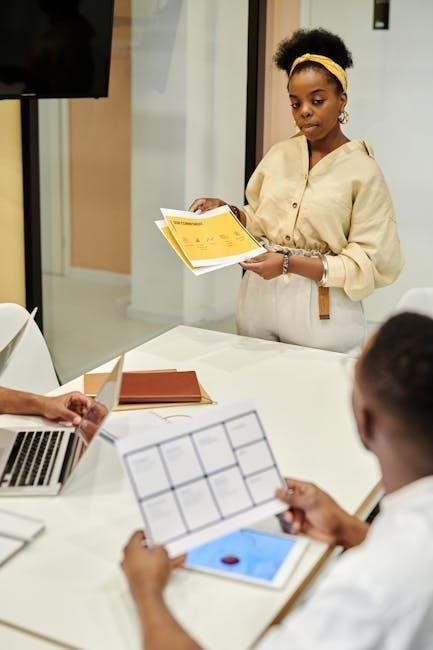
Real-World Applications
Workshops often include case studies, simulations, and practical tasks to bridge theory and practice․ These activities help leaders apply skills in real workplace scenarios, enhancing their impact and decision-making abilities․
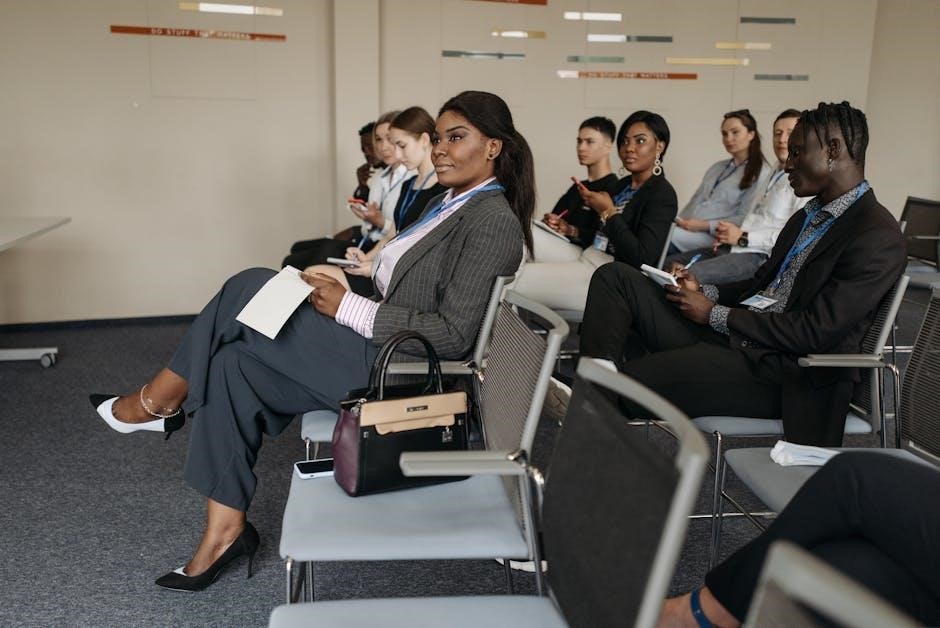
Case Studies in Leadership
Case studies are a powerful tool in leadership workshops, offering practical insights into real-world scenarios․ Participants analyze successful and challenging leadership situations, such as decision-making under pressure or conflict resolution․ These studies, often drawn from well-known leadership models like Jim Kouzes and Barry Posner’s The Leadership Challenge, provide actionable lessons․ Workshops include exercises where participants discuss and apply these case studies to their own experiences, fostering problem-solving and strategic thinking․ For example, a case study on crisis management might explore how a leader navigated organizational change or resolved ethical dilemmas․ By examining these scenarios, leaders gain a deeper understanding of effective strategies and principles, enabling them to apply these learnings in their own workplaces․ Many of these case studies are available in downloadable PDF formats, making them accessible for further review and implementation․ This approach bridges theory and practice, ensuring leaders are equipped to handle real-world challenges effectively․
Simulations of Leadership Scenarios
Simulations of leadership scenarios are interactive exercises that replicate real-world challenges, allowing participants to practice decision-making, problem-solving, and strategic planning․ These simulations are designed to mirror workplace situations, such as crisis management, team conflicts, or organizational change․ Participants engage in role-playing or virtual environments to test leadership strategies and observe outcomes․ For example, a simulation might involve leading a virtual team through a merger or resolving ethical dilemmas under pressure․ These exercises provide safe spaces for leaders to experiment, learn from mistakes, and refine their skills․ Many workshops offer downloadable PDF guides with step-by-step instructions and evaluation tools, ensuring participants can apply these lessons in real-life scenarios․ Simulations bridge the gap between theory and practice, equipping leaders with practical experience and confidence․
Applying Workshop Learnings to the Workplace
Workshops often emphasize the practical application of leadership skills, ensuring participants can seamlessly transition learnings into their professional roles․ Many leadership workshop activities include tools like action plans, reflection exercises, and real-world case studies to help leaders implement strategies effectively․ For instance, participants might create personalized development plans, outlining specific goals and steps to improve communication or decision-making; Additionally, workshops provide resources, such as downloadable PDF guides, to support ongoing learning and application․ By focusing on actionable steps and measurable outcomes, these activities empower leaders to drive positive change and enhance team performance․ The ultimate goal is to bridge the gap between workshop insights and everyday workplace challenges, fostering sustainable growth and leadership excellence․
Workshops conclude with actionable steps, empowering leaders to implement new skills․ Participants create personal development plans, fostering continuous growth and workplace impact through applied learning strategies․
Summarizing Key Takeaways
Effective leadership workshops emphasize skill development, collaboration, and practical application․ Participants gain insights into communication, emotional intelligence, and decision-making․ Tools like The Leadership Challenge and Dare to Lead provide frameworks for growth․ Activities such as role-playing and group problem-solving foster teamwork and trust․ Workshops also highlight the importance of self-assessment and feedback, enabling leaders to refine their strategies․ By connecting theoretical concepts to real-world scenarios, participants leave equipped with actionable plans to enhance their leadership impact․ These takeaways ensure continuous improvement and empower leaders to drive positive change in their organizations․
Creating a Personal Action Plan
A personal action plan is a crucial step in applying leadership workshop learnings․ Participants identify strengths, areas for improvement, and specific goals․ Using tools like Dare to Lead or The Leadership Challenge, individuals outline actionable steps to enhance their leadership skills․ The plan should include measurable objectives, timelines, and strategies for overcoming challenges․ Workshops often provide templates or exercises to guide this process, ensuring clarity and focus․ By aligning personal goals with organizational needs, leaders create a roadmap for continuous growth․ Regular self-assessment and feedback loops help track progress, fostering accountability and sustained development․ This personalized approach ensures workshop insights are effectively translated into real-world leadership practices, driving long-term impact and improvement․
Evaluating Workshop Effectiveness
Evaluating workshop effectiveness ensures learning is translated into measurable outcomes․ Post-workshop assessments often include participant feedback, skill demonstrations, and impact surveys․ Tools like pre- and post-assessment surveys help gauge knowledge retention and behavior change․ Practical exercises and role-playing scenarios provide observable metrics for leadership growth․ Follow-up sessions and progress tracking offer insights into long-term application․ Workshops may also use peer reviews and self-assessments to measure individual development․ By aligning evaluation methods with workshop objectives, organizers can refine future programs and ensure they meet participant needs․ Effective evaluation fosters accountability, highlights successes, and identifies areas for improvement, ultimately enhancing the overall impact of leadership development initiatives․

